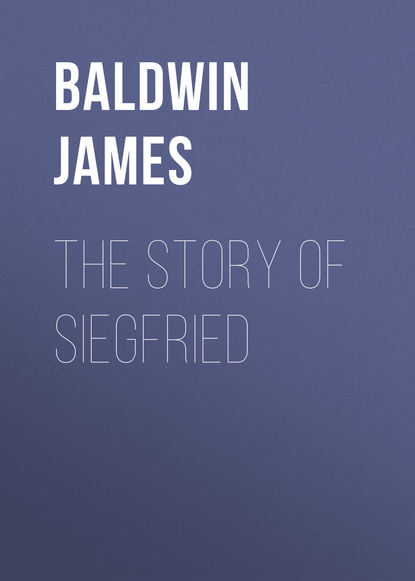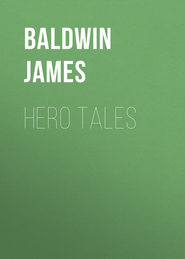По всем вопросам обращайтесь на: info@litportal.ru
(©) 2003-2024.
✖
The Story of Siegfried
Настройки чтения
Размер шрифта
Высота строк
Поля
No sooner were the strange huntsmen well out of sight than Fafnir and Regin began to ask their father to divide the glittering hoard with them.
“By our strength and through our advice,” said they, “this great store has come into your hands. Let us place it in three equal heaps, and then let each take his share and go his way.”
At this the farmer waxed very angry; and he loudly declared that he would keep all the treasure for himself, and that his sons should not have any portion of it whatever. So Fafnir and Regin, nursing their disappointment, went to the fields to watch their sheep; but their father sat down to guard his new-gotten treasure. And he took in his hand the glittering serpent-ring, and gazed into its cold ruby eyes: and, as he gazed, all his thoughts were fixed upon his gold; and there was no room in his heart for love toward his fellows, nor for deeds of kindness, nor for the worship of the All-Father. And behold, as he continued to look at the snaky ring, a dreadful change came over him. The warm red blood, which until that time had leaped through his veins, and given him life and strength and human feelings, became purple and cold and sluggish; and selfishness, like serpent-poison, took hold of his heart. Then, as he kept on gazing at the hoard which lay before him, he began to lose his human shape; his body lengthened into many scaly folds, and he coiled himself around his loved treasures,—the very likeness of the ring upon which he had looked so long.
When the day drew near its close, Fafnir came back from the fields with his herd of sheep, and thought to find his father guarding the treasure, as he had left him in the morning; but instead he saw a glittering snake, fast asleep, encircling the hoard like a huge scaly ring of gold. His first thought was that the monster had devoured his father; and, hastily drawing his sword, with one blow he severed the serpent’s head from its body. And, while yet the creature writhed in the death-agony, he gathered up the hoard, and fled with it beyond the hills of Hunaland, until on the seventh day he came to a barren heath far from the homes of men. There he placed the treasures in one glittering heap; and he clothed himself in a wondrous mail-coat of gold that was found among them, and he put on the Helmet of Dread, which had once been the terror of the mid-world, and the like of which no man had ever seen; and then he gazed with greedy eyes upon the fateful ring, until he, too, was changed into a cold and slimy reptile,—a monster dragon. And he coiled himself about the hoard; and, with his restless eyes forever open, he gloated day after day upon his loved gold, and watched with ceaseless care that no one should come near to despoil him of it. This was ages and ages ago; and still he wallows among his treasures on the Glittering Heath, and guards as of yore the garnered wealth of Andvari.[10 - The Hoard.This story is found in both the Elder and the Younger Eddas, and is really the basis upon which the entire plot of the legend of Sigurd, or Siegfried, is constructed. See also.]
When I, Regin, the younger brother, came back in the late evening to my father’s dwelling, I saw that the treasure had been carried away; and, when I beheld the dead serpent lying in its place, I knew that a part of Andvari’s curse had been fulfilled. And a strange fear came over me; and I left every thing behind me, and fled from that dwelling, never more to return. Then I came to the land of the Volsungs, where your father’s fathers dwelt, the noblest king-folk that the world has ever seen. But a longing for the gold and the treasure, a hungry yearning, that would never be satisfied, filled my soul. Then for a time I sought to forget this craving. I spent my days in the getting of knowledge and in teaching men-folk the ancient lore of my kin, the Dwarfs. I taught them how to plant and to sow, and to reap the yellow grain. I showed them where the precious metals of the earth lie hidden, and how to smelt iron from its ores,—how to shape the ploughshare and the spade, the spear and the battle-axe. I taught them how to tame the wild horses of the meadows, and how to train the yoke-beasts to the plough; how to build lordly dwellings and mighty strongholds, and how to sail in ships across old AEgir’s watery kingdom. But they gave me no thanks for what I had done; and as the years went by they forgot who had been their teacher, and they said that it was Frey who had given them this knowledge and skill. And I taught the young maidens how to spin and weave, and to handle the needle deftly,—to make rich garments, and to work in tapestry and embroidery. But they, too, forgot me, and said that it was Freyja who had taught them. Then I showed men how to read the mystic runes aright, and how to make the sweet beverage of poetry, that charms all hearts, and enlightens the world. But they say now that they had these gifts from Odin. I taught them how to fashion the tales of old into rich melodious songs, and with music and sweet-mouthed eloquence to move the minds of their fellow-men. But they say that Bragi taught them this; and they remember me only as Regin, the elfin schoolmaster, or at best as Mimer, the master of smiths. At length my heart grew bitter because of the neglect and ingratitude of men; and the old longing for Andvari’s hoard came back to me, and I forgot much of my cunning and lore. But I lived on and on, and generations of short-lived men arose and passed, and still the hoard was not mine; for I was weak, and no man was strong enough to help me.
Then I sought wisdom of the Norns, the weird women who weave the woof of every creature’s fate.[11 - The Norns.The Norns are the Fates, which watch over man through life. They are Urd the Past, Verdande the Present, and Skuld the Future. They approach every new-born child, and utter his doom. They are represented as spinning the thread of fate, one end of which is hidden by Urd in the far east, the other by Verdande in the far west. Skuld stands ready to rend it in pieces. —See Grimm’s Teutonic Mythology, p. 405, also Anderson’s Norse Mythology, p. 209.The three weird women in Shakespeare’s Tragedy of Macbeth represent a later conception of the three Norns, now degraded to mere witches.Compare the Norns with the Fates of the Greek Mythology. These, also, are three in number. They sit clothed in white, and garlanded, singing of destiny. Clotho, the Past, spins; Lachesis, the Present, divides; and Atropos, the Future, stands ready with her shears to cut the thread.][12 - The Idea of Fatality.Throughout the story of the Nibelungs and Volsungs, of Sigurd and of Siegfried,—whether we follow the older versions or the mote recent renderings,—there is, as it were, an ever-present but indefinable shadow of coming fate, “a low, inarticulate voice of Doom,” foretelling the inevitable. This is but in consonance with the general ideas of our Northern ancestors regarding the fatality which shapes and controls every man’s life. These ideas are embodied in more than one ancient legend. We find them in the old Anglo-Saxon poem of Beowulf. “To us,” cries Beowulf in his last fight, “to us it shall be as our Weird betides,—that Weird that is every man’s lord!” “Each man of us shall abide the end of his life-work; let him that may work, work his doomed deeds ere death comes!” Similar ideas prevailed among the Greeks. Read, for example, that passage in the Iliad describing the parting of Hector and Andromache, and notice the deeper meaning of Hector’s words.]
“How long,” asked I, “must I hope and wait in weary expectation of that day when the wealth of the world and the garnered wisdom of the ages shall be mine?”
And the witches answered, “When a prince of the Volsung race shall come who shall excel thee in the smithying craft, and to whom the All-Father shall give the Shining Hope as a helper, then the days of thy weary watching, shall cease.”
“How long,” asked I, “shall I live to enjoy this wealth and this wisdom, and to walk as a god among men? Shall I be long-lived as the Asa-folk, and dwell on the earth until the last Twilight comes?”
“It is written,” answered Skuld, “that a beardless youth shall see thy death. But go thou now, and bide thy time.”
Here Regin ended his story, and both he and Siegfried sat for a long time silent and thoughtful.
“I know what you wish,” said Siegfried at last. “You think that I am the prince of whom the weird sisters spoke; and you would have me slay the dragon Fafnir, and win for you the hoard of Andvari.”
“It is even so,” answered Regin.
“But the hoard is accursed,” said the lad.
“Let the curse be upon me,” was the answer. “Is not the wisdom of the ages mine? And think you that I cannot escape the curse? Is there aught that can prevail against him who has all knowledge and the wealth of the world at his call?”
“Nothing but the word of the Norns and the will of the All-Father,” answered Siegfried.
“But will you help me?” asked Regin, almost wild with earnestness. “Will you help me to win that which is rightfully mine, and to rid the world of a horrible evil?”
“Why is the hoard of Andvari more thine than Fafnir’s?”
“He is a monster, and he keeps the treasure but to gloat upon its glittering richness. I will use it to make myself a name upon the earth. I will not hoard it away. But I am weak, and he is strong and terrible. Will you help me?”
“To-morrow,” said Siegfried, “be ready to go with me to the Glittering Heath. The treasure shall be thine, and also the curse.”
“And also the curse,” echoed Regin.
Adventure IV. Fafnir, the Dragon
Regin took up his harp, and his fingers smote the strings; and the music which came forth sounded like the wail of the winter’s wind through the dead treetops of the forest. And the song which he sang was full of grief and wild hopeless yearning for the things which were not to be. When he had ceased, Siegfried said,—
“That was indeed a sorrowful song for one to sing who sees his hopes so nearly realized. Why are you so sad? Is it because you fear the curse which you have taken upon yourself? or is it because you know not what you will do with so vast a treasure, and its possession begins already to trouble you?”
“Oh, many are the things I will do with that treasure!” answered Regin; and his eyes flashed wildly, and his face grew red and pale. “I will turn winter into summer; I will make the desert-places glad; I will bring back the golden age; I will make myself a god: for mine shall be the wisdom and the gathered wealth of the world. And yet I fear”—
“What do you fear?”
“The ring, the ring—it is accursed! The Norns, too, have spoken, and my doom is known. I cannot escape it.”
“The Norns have woven the woof of every man’s life,” answered Siegfried. “To-morrow we fare to the Glittering Heath, and the end shall be as the Norns have spoken.”
And so, early the next morning, Siegfried mounted Greyfell, and rode out towards the desert-land that lay beyond the forest and the barren mountain-range; and Regin, his eyes flashing with desire, and his feet never tiring, trudged by his side. For seven days they wended their way through the thick greenwood, sleeping at night on the bare ground beneath the trees, while the wolves and other wild beasts of the forest filled the air with their hideous howlings. But no evil creature dared come near them, for fear of the shining beams of light which fell from Greyfell’s gleaming mane. On the eighth day they came to the open country and to the hills, where the land was covered with black bowlders and broken by yawning chasms. And no living thing was seen there, not even an insect, nor a blade of grass; and the silence of the grave was over all. And the earth was dry and parched, and the sun hung above them like a painted shield in a blue-black sky, and there was neither shade nor water anywhere. But Siegfried rode onwards in the way which Regin pointed out, and faltered not, although he grew faint with thirst and with the overpowering heat. Towards the evening of the next day they came to a dark mountain-wall which stretched far out on either hand, and rose high above them, so steep that it seemed to close up the way, and to forbid them going farther.
“This is the wall!” cried Regin. “Beyond this mountain is the Glittering Heath, and the goal of all my hopes.”
And the little old man ran forwards, and scaled the rough side of the mountain, and reached its summit, while Siegfried and Greyfell were yet toiling among the rocks at its foot. Slowly and painfully they climbed the steep ascent, sometimes following a narrow path which wound along the edge of a precipice, sometimes leaping, from rock to rock, or over some deep gorge, and sometimes picking their way among the crags and cliffs. The sun at last went down, and one by one the stars came out; and the moon was rising, round and red, when Siegfried stood by Regin’s side, and gazed from the mountain-top down upon the Glittering Heath which lay beyond. And a strange, weird scene it was that met his sight. At the foot of the mountain was a river, white and cold and still; and beyond it was a smooth and barren plain, lying silent and lonely in the pale moonlight. But in the distance was seen a circle of flickering flames, ever changing,—now growing brighter, now fading away, and now shining with a dull, cold light, like the glimmer of the glow-worm or the fox-fire. And as Siegfried gazed upon the scene, he saw the dim outline of some hideous monster moving hither and thither, and seeming all the more terrible in the uncertain light.
“It is he!” whispered Regin, and his lips were ashy pale, and his knees trembled beneath him. “It is Fafnir, and he wears the Helmet of Terror! Shall we not go back to the smithy by the great forest, and to the life of ease and safety that may be ours there? Or will you rather dare to go forwards, and meet the Terror in its abode?”
“None but cowards give up an undertaking once begun,” answered Siegfried. “Go back to Rhineland yourself, if you are afraid; but you must go alone. You have brought me thus far to meet the dragon of the heath, to win the hoard of the swarthy elves, and to rid the world of a terrible evil. Before the setting of another sun, the deed which you have urged me to do will be done.”
Then he dashed down the eastern slope of the mountain, leaving Greyfell and the trembling Regin behind him. Soon he stood on the banks of the white river, which lay between the mountain and the heath; but the stream was deep and sluggish, and the channel was very wide. He paused a moment, wondering how he should cross; and the air seemed heavy with deadly vapors, and the water was thick and cold. While he thus stood in thought, a boat came silently out of the mists, and drew near; and the boatman stood up and called to him, and said,—
“What man are you who dares come into this land of loneliness and fear?”
“I am Siegfried,” answered the lad; “and I have come to slay Fafnir, the Terror.”
“Sit in my boat,” said the boatman, “and I will carry you across the river.”
And Siegfried sat by the boatman’s side; and without the use of an oar, and without a breath of air to drive it forwards, the little vessel turned, and moved silently towards the farther shore.
“In what way will you fight the dragon?” asked the boatman.
“With my trusty sword Balmung I shall slay him,” answered Siegfried.
“But he wears the Helmet of Terror, and he breathes deathly poisons, and his eyes dart forth lightning, and no man can withstand his strength,” said the boatman.
“I will find some way by which to overcome him.”
“Then be wise, and listen to me,” said the boatman. “As you go up from the river you will find a road, worn deep and smooth, starting from the water’s edge, and winding over the moor. It is the trail of Fafnir, adown which he comes at dawn of every day to slake his thirst at the river. Do you dig a pit in this roadway,—a pit narrow and deep,—and hide yourself within it. In the morning, when Fafnir passes over it, let him feel the edge of Balmung.”
As the man ceased speaking, the boat touched the shore, and Siegfried leaped out. He looked back to thank his unknown friend, but neither boat nor boatman was to be seen. Only a thin white mist rose slowly from the cold surface of the stream, and floated upwards and away towards the mountain-tops. Then the lad remembered that the strange boatman had worn a blue hood bespangled with golden stars, and that a gray kirtle was thrown over his shoulders, and that his one eye glistened and sparkled with a light that was more than human. And he knew that he had again talked with Odin. Then, with a braver heart than before, he went forwards, along the river-bank, until he came to Fafnir’s trail,—a deep, wide furrow in the earth, beginning at the river’s bank, and winding far away over the heath, until it was lost to sight in the darkness. The bottom of the trail was soft and slimy, and its sides had been worn smooth by Fafnir’s frequent travel through it.
In this road, at a point not far from the river, Siegfried, with his trusty sword Balmung, scooped out a deep and narrow pit, as Odin had directed. And when the gray dawn began to appear in the east he hid himself within this trench, and waited for the coming of the monster. He had not long to wait; for no sooner had the sky begun to redden in the light of the coming sun than the dragon was heard bestirring himself. Siegfried peeped warily from his hiding-place, and saw him coming far down the road, hurrying with all speed, that he might quench his thirst at the sluggish river, and hasten back to his gold; and the sound which he made was like the trampling of many feet and the jingling of many chains. With bloodshot eyes, and gaping mouth, and flaming nostrils, the hideous creature came rushing onwards. His sharp, curved claws dug deep into the soft earth; and his bat-like wings, half trailing on the ground, half flapping in the air, made a sound like that which is heard when Thor rides in his goat-drawn chariot over the dark thunder-clouds. It was a terrible moment for Siegfried, but still he was not afraid. He crouched low down in his hiding-place, and the bare blade of the trusty Balmung glittered in the morning light. On came the hastening feet and the flapping wings: the red gleam from the monster’s flaming nostrils lighted up the trench where Siegfried lay. He heard a roaring and a rushing like the sound of a whirlwind in the forest; then a black, inky mass rolled above him, and all was dark. Now was Siegfried’s opportunity. The bright edge of Balmung gleamed in the darkness one moment, and then it smote the heart of Fafnir as he passed. Some men say that Odin sat in the pit with Siegfried, and strengthened his arm and directed his sword, or else he could not thus have slain the Terror. But, be this as it may, the victory was soon won. The monster stopped short, while but half of his long body had glided over the pit; for sudden death had overtaken him. His horrid head fell lifeless upon the ground; his cold wings flapped once, and then lay, quivering and helpless, spread out on either side; and streams of thick black blood flowed from his heart, through the wound beneath, and filled the trench in which Siegfried was hidden, and ran like a mountain-torrent down the road towards the river. Siegfried was covered from head to foot with the slimy liquid, and, had he not quickly leaped from his hiding-place, he would have been drowned in the swift-rushing, stream.[13 - The Dragon.The oldest form of this story is the Song of Sigurd Fafnisbane, in the Elder Edda. The English legend of St. George and the Dragon was probably derived from the same original sources. A similar myth may be found among all Aryan peoples. Sometimes it is a treasure, sometimes a beautiful maiden, that the monster guards, or attempts to destroy. Its first meaning was probably this: The maiden, or the treasure, is the earth in its beauty and fertility. “The monster is the storm-cloud. The hero who fights it is the sun, with his glorious sword, the lightning-flash. By his victory the earth is relieved from her peril. The fable has been varied to suit the atmospheric peculiarities of different climes in which the Aryans found themselves.... In Northern mythology the serpent is probably the winter cloud, which broods over and keeps from mortals the gold of the sun’s light and heat, till in the spring the bright orb overcomes the powers of darkness and tempest, and scatters his gold over the face of the earth.” This myth appears in a great variety of forms among the Scandinavian and German nations. In the Eddas, Sigurd (Siegfried) is represented as roasting the heart of Fafnir, and touching it to his lips. We have ventured to present a less revolting version.—See Baring-Gould’s Curious Myths of the Middle Ages.“The slaying of the dragon Fafnir reminds us of Python, whom Apollo overcame; and, as Python guarded the Delphic Oracle, the dying Fafnir prophesies.”—Jacob Grimm.]
The bright sun rose in the east, and gilded the mountain-tops, and fell upon the still waters of the river, and lighted up the treeless plains around. The south wind played gently against Siegfried’s cheeks and in his long hair, as he stood gazing on his fallen foe. And the sound of singing birds, and rippling waters, and gay insects,—such as had not broken the silence of the Glittering Heath for ages,—came to his ears. The Terror was dead, and Nature had awakened from her sleep of dread. And as the lad leaned upon his sword, and thought of the deed he had done, behold! the shining Greyfell, with the beaming, hopeful mane, having crossed the now bright river, stood by his side. And Regin, his face grown wondrous cold, came trudging over the meadows; and his heart was full of guile. Then the mountain vultures came wheeling downwards to look upon the dead dragon; and with them were two ravens, black as midnight. And when Siegfried saw these ravens he knew them to be Odin’s birds,—Hugin, thought, and Munin, memory. And they alighted on the ground near by; and the lad listened to hear what they would say. Then Hugin flapped his wings, and said,—
“The deed is done. Why tarries the hero?”
And Munin said,—
“The world is wide. Fame waits for the hero.”
And Hugin answered,—











